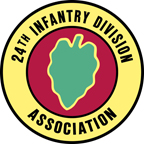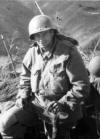Korean Rain
By Mel L. Frederick, “E” 19th Korea, 1951-52
Any infantryman who served in combat has so many experiences he can never forget — the constant artillery barrages raining on you daily, the machine gun tracers lighting up the night sky, the mortars silently dropping their teardrops of death, your friends and buddies that never made it home, and some who did who would never be the same, your best friend dying in your arms. These are things you will not forget.
But there are some other things that you may not think about that are still entrenched in my memory for nearly 60 years. Two of these are what I write about here.
I was fortunate to be a Sgt 1st class when I boarded a ship to Japan on my way to Korea. Another Sgt and I shared a cabin — with beds that had innerspring mattresses, and a fresh water shower!
We arrived at Inchon where we were greeted with a scene of total devastation. We then went through Seoul on our way to the replacement center; the city was in shambles, narrow streets, shacks turned into piles of rubble, the President’s Palace just a burned out shell, buildings and light poles pockmarked by bullets, bridges collapsed in the river, just total chaos.
We finally arrived at our destination. I can’t say where it was but it was just a stopping off place so we could be shuffled out like so many playing cards to various outfits as replacements. We left friends we had made on the voyage and joined our new units.
That’s when I learned my first reality — infantrymen in Korea didn’t have beds. The “room” in room and board did not exist. You slept on the ground in whatever spot you ended up at dark, or you dug a hole or found whatever shelter you could find, but, in all my days in Korea I never slept in a bed.
My first night in Korea was at the replacement center. We were pointed towards an empty field beside some bombed out buildings and told to pitch our tents for the night. I carefully trenched around my tent to keep water away, and settled down for a well deserved rest after a long day.
During the night it began to rain and continued to pour for the rest of the night. The trench around my tent soon filled, then the water crept up under my ground tarp. Soon I was floating in water.
All of us left our tents and headed toward the bombed out buildings to seek shelter. But there were no roofs and all we could do was huddle next to the walls and wait for dawn and continue to get soaked. I don’t know why we were so anxious for dawn as that did nothing to keep us dry.
That was my first encounter with Korean rain, but not my last!
We had many rainy times in Korea, but I only have vivid memories of some. Another of these was an indelible night in late October.
We were on the front lines and my Lt and I were sharing a foxhole on the front slope of the hill. It was nice and deep, almost three feet or so.
It began to rain, and finally turned into a real downpour. We had a poncho and rigged it so we could trench around the back and still leave the forward side open so we could keep watch for the enemy.
The rain finally washed out the back of the foxhole and water poured in. We could not cover the hole and still see out so all we could do was huddle together to keep warm, and continue our outlook. The cold, and the rain coming down on us and pouring into the bottom of the hole, made for another memorable Korean night in the rain.
I also remember Thanksgiving Day 1951 — just two days before my 22nd birthday! Our Company was in reserve.
We had been in continuous combat in Operation Nomad for almost a month and a half, and this was our first chance to get out of our filthy clothes and take a shower.
A large platoon tent had been erected for us, the first time we were not sleeping in our own poncho shelters. And, we also had new down sleeping bags and we thought we would be cozy that night.
And in addition to all that, I had just been given the Platoon’s beer ration — three cans per man. We were really in hog heaven!
But a few hours before dawn we got word the Chinese had broken through the line and we were to move up and plug the gap. On our way out we passed the mess tent. The smell of the turkeys roasting and the other foods being prepared tempted our taste buds — just like home on Thanksgiving mornings as our mothers prepared a feast for us.
But we had to leave our dinner behind, along with our sleeping bags and the almost unheard of tent over our heads. We got our Thanksgiving dinner online later; I don’t recall if it was later that day or the next.
And guess what came with it — rain! We stood in the rain and ate our special Thanksgiving dinner; the rain turned our feast into a soggy, wet, cold mixture of food and rainwater!
That was about the last of the rain as late November in North Korea, snow, lots of snow, and bitter cold, replaced the rain.
We were then in a holding pattern and traded our open foxholes for bunkers. Though not heated, they kept out some of the wind. But the fronts had to be open so we could be vigilant for the enemy, but it sure beat an open hole in the ground.
I love the smell of a Minnesota rain and sometimes like to walk in a light one, but my memories of Korean rain still linger — somewhat poignant and sometimes humorous, but a memory that I still have.
Mel L. Frederick, 950 W. Barney, Owatonna, MN 55060-3800, Summer MN 507-455-1639, Winter CA 760-772-7909.
The Taro Leaf, Vol 63(2) Spring 2009, pg. 14-15.
.


